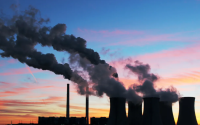 The trend towards increased energy efficiency is levelling off |
The Global Carbon Project says that emissions were rising by less than 1% annually up to the year 2000, but are now rising at 2.5% per year.
It says the acceleration comes mainly from a rise in charcoal consumption and a lack of new energy efficiency gains.
The global research network released its latest analysis at a scientific meeting in Australia.
Dr Mike Rapauch of the Australian government's research organisation CSIRO, who co-chairs the Global Carbon Project, told delegates that 7.9 billion tonnes (gigatonnes, Gt) of carbon passed into the atmosphere last year. In 2000, the figure was 6.8Gt.
"From 2000 to 2005, the growth rate of carbon dioxide emissions was more than 2.5% per year, whereas in the 1990s it was less than 1% per year," he said.
The finding parallels figures released earlier this month by the World Meteorological Organization showing that the rise in atmospheric concentrations of CO2 had accelerated in the last few years.
Intense findings
The Global Carbon Project draws its data from a wide range of sources, including measurements of carbon dioxide levels in the atmosphere and studies on fossil fuel use.
From that data, researchers have extracted two trends which they believe explain the sharp upturn found around the year 2000.
 "The assumption is we will solve the problem by controlling demand; but regulating at the point of use is clearly not working" Myles Allen |
"From about 1970 the intensity decreased - we became more efficient at using energy - but we've been getting slightly worse since the year 2000," she told the BBC News website.
"The other trend is that as oil becomes more expensive, we're seeing a switch from oil burning to charcoal which is more polluting in terms of carbon."
The Project does not have data on precisely where this is happening, but there is anecdotal evidence of increases in charcoal burning in parts of Asia and Africa.
There have been suggestions that as temperatures rise, carbon sinks - natural systems which absorb carbon dioxide - may become less efficient; but Professor Le Quere said there was no evidence that this is happening systematically.
"The land sink has been very much affected by recent droughts, especially in the Northern Hemisphere," she said, "but the ocean sink looks relatively stable and it doesn't seem there is a global trend."
Upper limits
How emissions will change over time is one of the factors considered by the Intergovernmental Panel on Climate Change (IPCC), the body responsible for collating and analysing climate data for the global community.
 Australia under John Howard is increasing coal exports |
The "high end" of IPCC projections implies a rise in global temperature approaching 5.8C between 1990 and the end of this century.
"We need to think about radical alternatives to the belt-tightening approach," said Professor Allen.
"At the moment, the assumption is we will solve the problem by controlling demand; but regulating at the point of use is clearly not working."
At the recent United Nations climate summit in Nairobi, a number of delegations, including those of Britain, Australia and the US, pointed out that they had managed to grow their economies without significant increases in carbon emissions.
But, said Corinne Le Quere, the latest data showed this approach would not be enough to curb emissions in the future.
"Improvements that have been made in the last 30 years appear to be stalling," she said. "We are going to need a real decrease in emissions."






